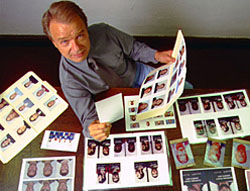The Psychology of ID'ing Criminals

Get the world’s most fascinating discoveries delivered straight to your inbox.
You are now subscribed
Your newsletter sign-up was successful
Want to add more newsletters?

Delivered Daily
Daily Newsletter
Sign up for the latest discoveries, groundbreaking research and fascinating breakthroughs that impact you and the wider world direct to your inbox.

Once a week
Life's Little Mysteries
Feed your curiosity with an exclusive mystery every week, solved with science and delivered direct to your inbox before it's seen anywhere else.

Once a week
How It Works
Sign up to our free science & technology newsletter for your weekly fix of fascinating articles, quick quizzes, amazing images, and more

Delivered daily
Space.com Newsletter
Breaking space news, the latest updates on rocket launches, skywatching events and more!

Once a month
Watch This Space
Sign up to our monthly entertainment newsletter to keep up with all our coverage of the latest sci-fi and space movies, tv shows, games and books.

Once a week
Night Sky This Week
Discover this week's must-see night sky events, moon phases, and stunning astrophotos. Sign up for our skywatching newsletter and explore the universe with us!
Join the club
Get full access to premium articles, exclusive features and a growing list of member rewards.
This ScienceLives article was provided to LiveScience in partnership with the National Science Foundation.
Gary Wells is an expert in scientific psychology and eyewitness memory. A distinguished professor of psychology at Iowa State University and Director of Social Science for the American Judicature Society’s Institute of Forensic Science and Public Policy, Wells’ work mostly focuses on the reliability of eyewitness identification. Wells’ findings have been incorporated into standard textbooks in psychology and law, and his research-based proposals on lineup procedures are being increasingly accepted in law enforcement practices across the United States. For more on Wells’ research, read Re-Examining Eyewitness Identifications and Mistaken Identity: How Feedback "After the Fact" Influences Eyewitnesses; for Wells’ answers to the ScienceLives 10 Questions, see below.
Name: Gary L. Wells Age: 59 Institution: Iowa State University Field of Study: Psychology
What inspired you to choose this field of study? I was intrigued when I took introductory psychology and discovered that almost all the people whose work I was reading about were still alive. It made me realize how young of a science psychology really is. Hence, I figured that some of the greatest studies were yet to be conducted, that there was opportunity in the field, and perhaps people would read about my work someday.
What is the best piece of advice you ever received? Two words: "Measure it." No single person told me this but, in effect, many of my professors said it in one way or another. If you don't measure it, you cannot study it scientifically.
What was your first scientific experiment as a child? It was with my dog, Jingles, and I was probably about 8. I always tried to sneak up on him when he was sleeping, but he would always raise his head and look at me when I got within 3 feet or so. I thought he was detecting my scent, so I used a fan to make my scent upwind and, sure enough, I could sneak up on him. But my experiment was flawed. Only later did I realize that he was actually hearing me. I discovered this when I found that the direction of the fan did not matter. It was the white noise from the fan that permitted me to sneak up on him.
What is your favorite thing about being a scientist or researcher? Simply discovering something new, something that people did not know before. I suppose it is the same thing that drives explorers.
Get the world’s most fascinating discoveries delivered straight to your inbox.
What is the most important characteristic a scientist must demonstrate in order to be an effective scientist? A healthy dose of skepticism and an understanding of what evidence and proof really mean. This is important for non-scientists as well, but most people do not realize it.
What are the societal benefits of your research? The direct benefit is increasing the reliability of eyewitness identification evidence, thereby reducing the chances of convicting innocent people of crimes. But I also think that this work is building nascent bridges between psychological science and the justice system that will spill over to other problems.
Who has had the most influence on your thinking as a researcher? I have taken a lot of different things from different people. For instance, My Ph.D. advisor, Anthony Greenwald, taught me how to avoid confirmation bias in how I design experiments. Elizabeth Loftus showed me that there is no necessary incompatibility between scientific soundness and applied relevance in research.
What about your field or being a scientist do you think would surprise people the most? The extent to which it is grounded in scientific methods. Most people still do not think about psychology as a science. But, the methods we use for manipulating variables, measuring their effects, and analyzing data are not fundamentally different from most any other science.
If you could only rescue one thing from your burning office or lab, what would it be? A graduate mentoring award plaque on my wall. It is small and inconspicuous, but it means something to me.
What music do you play most often in your lab or car? Mostly music that captured a feeling of my generation, so it would not be unusual to hear Neil Young, for instance.
Editor's Note: This research was supported by the National Science Foundation (NSF), the federal agency charged with funding basic research and education across all fields of science and engineering. Any opinions, findings, and conclusions or recommendations expressed in this material are those of the author and do not necessarily reflect the views of the National Science Foundation. See the ScienceLives archive.
 Live Science Plus
Live Science Plus










